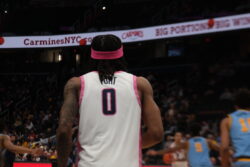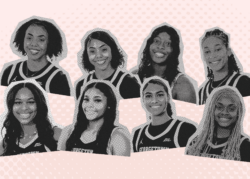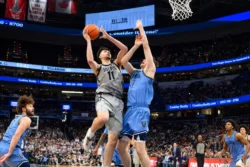It’s official: Americans are fed up with their own national pastime.
In a Zogby Interactive poll conducted over four days in December, only two percent of the 8,202 adults across the country voted baseball as the most ethical professional sport. The statistic is appalling, albeit not at all surprising in a time when every home run hit and base stolen carries with it the possibility of a performance-enhancing catalyst. Just as appalling, for me, is that the most ethical sport, according to the poll, is golf, with 36 percent of the vote.
I’m not saying golf is unethical. On the contrary, the Zogby poll results reflect my own views perfectly. But it just doesn’t seem right that the national pastime, the everyman sport, has become morally inferior to a game invented in a foreign country and made popular by the country-club elite.
It’s not that I am a jingoistic sports purist. In fact, for every pinstriped piece of Yankees baby clothing I had, there was a set of Fisher Price golf clubs and a soccer ball. But this poll troubled me enough to take to the Internet and explore current stories in each respective sport.
Spring training has barely even begun, but baseball headlines are already hilighting the steroid-dominated trend that plagued the league last year. The top story is Barry Bonds’ chase for Hank Aaron’s home run record. Aaron’s record is over 30 years old, and arguably the most heralded mark in all of baseball. The fact that an active player is a mere 21 home runs from Aaron’s 755 should be a cause for joy and excitement for modern baseball fans, but instead the chase is shrouded in controversy. The same Zogby poll found that only 38 percent of Americans believe that Bonds, heavily included in the steroid scandal, should be recognized as the home run champion if he eclipses Aaron’s record.
A search of the newest golf stories yielded a very different story, by Dan O’Neill of the St. Louis Post Dispatch. There may not be many sports fans familiar with Cardinals’ lineman Conrad Dobler, 1977’s “Pro Football’s Dirtiest Player” and three-time All-Pro. There are even fewer who know about Dobler’s current life. After his wife was paralyzed from the neck down falling out of a hammock, Dobler, suffering from chronic knee problems and pulmonary embolism, was forced to support her and the children alone. Despite his injuries, the National Football League has done nothing to help Dobler. This heartbreaking story did not receive any national attention, but it reached the ears of one of the most successful athletes in the Professional Golf Association: Phil Mickelson.
Mickelson contacted Dobler and offered to pay the tuition for his oldest daughter Holli’s school of choice, Miami of Ohio. Dobler says that he had never even met Phil, but did not turn down the generous offer. Holli maintains a 3.8 GPA and keeps her unlikely hero updated about her progress.
These are just two stories about two super-star athletes, but they are indicative of two sports that are moving in very different directions on the ethical spectrum. The saddest thing is that very few people have heard the story of Mickelson’s generosity, but everyone across the country knows about Bonds and the disgrace of Major League Baseball. If there is any hope for the future of the MLB in this poll, it is that fans are expressing their displeasure. Hopefully, the athletes, the commissioner and all the powers that be will heed these complaints.





